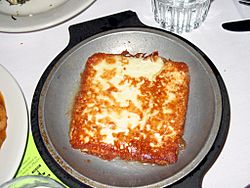Saganaki facts for kids
 |
|
| Course | Hors d'oeuvre |
|---|---|
| Place of origin | Greece |
| Variations | Many |
Saganaki is a yummy dish from Greece. It's usually a small plate of fried cheese served as an appetizer. The name comes from the special little frying pan it's cooked in.
Contents
What's in a Name? The Story of Saganaki
The word saganaki comes from the small frying pan it's cooked in. This pan is also called a saganaki. It's a smaller version of a sagani, which is a frying pan with two handles. The word sagani comes from the Turkish word sahan, meaning 'copper dish'.
What is Saganaki Made Of?
The most common saganaki is made with cheese. Chefs usually pick cheeses like graviera, kefalograviera, halloumi, kasseri, kefalotyri, or sheep's milk feta.
Some places use their own special cheeses. For example, in Arachova, they use formaela cheese. In Cyprus, they use halloumi. In Metsovo, they might use vlahotiri.
To make it, the cheese is melted in a small frying pan until it's bubbly. It's often served with a squeeze of lemon juice and a sprinkle of pepper. People usually eat it with bread.
Other Saganaki Dishes
Saganaki isn't just for cheese! Other dishes are also cooked in the same type of pan. These include shrimp saganaki (called garídes saganáki in Greek). There's also mussels saganaki (called mýdia saganáki). These dishes often have feta and a spicy tomato sauce.
The "Flaming Saganaki" Show
In many restaurants in the United States and Canada, saganaki is served with a fun show. After the cheese is fried, it's lit on fire right at your table! This is called "flaming saganaki."
When the flames go up, people often shout "Opa!" This is a Greek word that means "hooray!" or "cheers!" The flames are then put out with a squeeze of fresh lemon juice.
This exciting way of serving saganaki started in 1968. It happened at the Parthenon restaurant in Chicago's Greektown. A customer suggested the idea, and it became a popular tradition.
See also
 In Spanish: Saganaki para niños
In Spanish: Saganaki para niños
 | Delilah Pierce |
 | Gordon Parks |
 | Augusta Savage |
 | Charles Ethan Porter |

